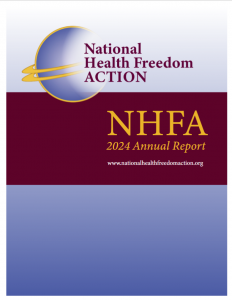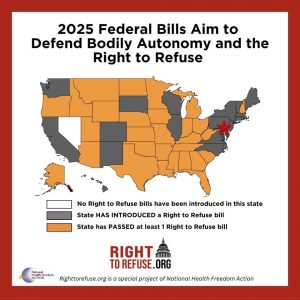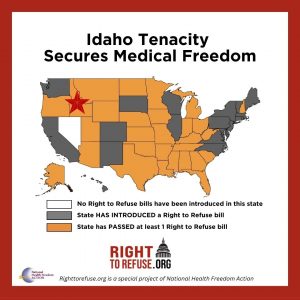
US District Court in California Rebukes Food Industry: GMO Labeling Rules Inadequate to Inform Public!
On September 13, 2022, Judge James Donato of the US District Court for Northern California issued a rebuke to the nation’s food industry, ruling in Natural Grocers, et al. v. Thomas Vilsack, et al, that a stand-alone text message disclosure option for bioengineered foods, aka GMOs, is not adequate to inform the public.
The judge starts with the 2016 Agricultural Marketing Act amendments by the US Congress. According to the Organic Consumers Association, this so called DARK Act resulted from folks in the organic movement, such as Stonyfield Farm and the Organic Trade Association, collaborating with Monsanto and the Obama administration in ensuring passage. The act outlawed state-mandated GMO labeling and implemented a “bioengineered” disclosure law, which allowed food companies to skip the label if they provide an electronic means to look up the information.
Plaintiffs Win Summary Judgement
In this case of Natural Grocers, et al. v. Thomas Vilsack, et al., the plaintiffs are retail stores which sell natural foods and food safety advocate groups including the Center for Food Safety, and the defendants are the USDA and its Secretary.
The complaint alleges several challenges to both the Act and its implementing regulations promulgated by the USDA. Specifically, they contest rules which, “(1) permit a text message disclosure option as an alternative to an electronic or digital link disclosure; (2) require disclosures to use the word “bioengineered”; and (3) “exclude highly refined foods that do not contain detectable amounts of modified genetic material.” They also allege that the word-use rules in the regulations unlawfully restrict their freedom of speech and that the Act’s preemption of state-level GMO labeling laws violates the Tenth Amendment’s reservation of rights to US states.
Judge Donato offered that this was the first law of its type, and that the purpose of the act was to, “establish uniformity in the way that bioengineered food is labeled and described to consumers.” At the outset of his opinion, Donato offers that he is granting the plaintiffs a summary judgement based solely on the “text message disclosure regulation” issue.
Study Found Tech Challenges in Accessing Information
The US Congress issued several directives to USDA for making regulations. It required that a bioengineered disclosure on labels take the form of a “text, symbol, or electronic or digital link,” with the “disclosure option to be selected by the food manufacturer.” The Act also directed USDA to “conduct a study to identify potential technological challenges that may impact whether consumers would have access to the bioengineering disclosure through electronic or digital disclosure methods.” If the study found that consumers would not have reasonable access to the disclosure methods, USDA was to, “provide additional and comparable options to access the bioengineering disclosure.”
The USDA’s Agricultural Marketing Service (AMS) hired Deloitte Consulting to study the ease of access for the allowed electronic disclosure. Deloitte found that “key technological challenges—-prevented nearly all participants from obtaining the information through electronic or digital disclosure methods,” and they conclude that “consumers would not have sufficient access the bioengineering disclosure through electronic or digital means under ordinary shopping conditions at this time.”
No “Additional and Comparable Options”
The plaintiffs argued that the text message disclosure option is contrary to the Act’s directive to, “provide additional and comparable options to access the bioengineering disclosure,” and Judge Donato agreed. He noted that Congress directed USDA to study technological challenges that can impact consumers’ access to bioengineering information via digital or electronic methods. And he said that, “No feat of analysis is necessary to conclude that Congress was especially concerned about whether consumers would be able to access bioengineering information through the electronic disclosure.” As to AMS’s decision to allow text message disclosure, this “did nothing to fix the problem of inaccessible electronic disclosures. It merely provided a fourth disclosure option that regulated entities can select instead of the electronic disclosure method.”
Center for Food Safety Led 20-Year Effort
AMS adopted the Deloitte recommendation in part, by requiring the telephone numbers included in package disclosures must offer information “regardless of the time of day.” But AMS failed to add “additional and comparable options….” While many manufacturers and retailers might support a standalone text message disclosure option, “that did not relieve AMS of the obligation to comply with Congress’s express direction to ‘provide additional and comparable options to access the bioengineering disclosure.’” So, the plaintiffs have shown that AMS’s position was “arbitrary, capricious, an abuse of discretion, or otherwise not in accordance with law.”
In concluding, Judge Donato found the text message regulation unlawful and granted a summary judgement for the plaintiffs. As to the electronic disclosure regulations in general, the judge remanded the case to AMS “for further consideration in a manner consistent with” the court order.
In a press release after the ruling, the Center for Food Safety’s counsel Meredith Stevenson noted that, “This is a victory for all Americans—-Today’s decision marks a key step toward ending the food industry’s deceptive and discriminatory GMO food labeling practices, which have kept consumers in the dark by concealing what’s in their products.” CFS has led a 20-year campaign for transparent GMO labeling, which exists in over 60 nations.
RECENT NEWS



One hundred Days of Making America Healthy Again
May 15, 2025

Idaho Tenacity Secures Medical Freedom
May 12, 2025
